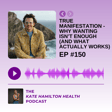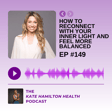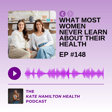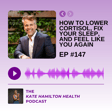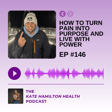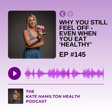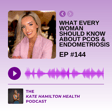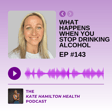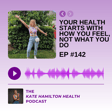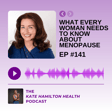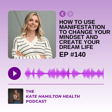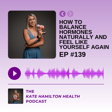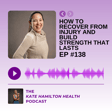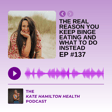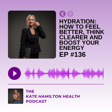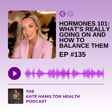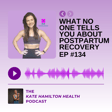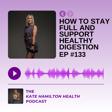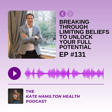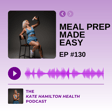
#132: Nicki Thompson: Overcome self-sabotage to build lasting health with mindset and habits
In this episode of the Kate Hamilton Health Podcast, I sit down with Nicki Thompson - a seasoned fitness and mindset coach with over 20 years of experience - to chat about her powerful journey from extreme restriction and binge cycles to true freedom around food and health.
We chat about how intermittent fasting can be more than a physical health tool. It can transform your mental clarity, emotional resilience, and overall relationship with your body. Nicki shares her insights on breaking free from toxic diet culture, understanding the psychology behind eating habits, and creating sustainable healthy habits rooted in your core values.
Whether you’ve struggled with restrictive eating, want to build lasting wellness routines, or are curious about fasting as part of a balanced lifestyle, this episode is packed with wisdom, actionable strategies, and a refreshing perspective on what real health looks like.
EPISODE HIGHLIGHTS:
[00:00] Welcome to the Kate Hamilton Health Podcast
[00:15] Meet Nicki Thompson: Fitness & Mindset Coach on a mission to transform health from the inside out
[00:23] Nicki’s personal story: From restriction to self-awareness and freedom
[00:44] The role of intermittent fasting in shifting health and mindset
[01:16] Building healthy habits through mindset shifts and self-awareness
[03:13] Nicki’s early years in the fitness industry and lessons from a toxic gym culture
[06:20] From body obsession to sustainable habits rooted in real health
[13:23] Redefining health, body image, and success
[16:59] Moving away from restriction toward small daily wins
[27:21] Making small, consistent changes for big long-term impact
[32:03] Introducing fasting in a mindful, balanced way
[44:25] The physical and emotional benefits of intermittent fasting
[47:55] Strategies for managing cravings while fasting
[52:10] Creating flexible fasting schedules that fit your life
[56:41] How to connect with Nicki
Links & Resources:
- Connect with me on Instagram here
- Connect with Nicki on Instagram here
- Learn more about KHH coaching here
- Download Nicki’s free guide here
If you enjoyed this episode, please subscribe, leave a review, and share it with friends who might benefit. For more health and fitness tips, follow me on Instagram and TikTok @katehamiltonhealth.
Music b LiQWYD Free download: hypeddit.com/link/xxtopb [http://hypeddit.com/link/xxtopb] Promoted by FreeMusicPromo [https://www.youtube.com/channel/UCbycji-eySnM3WD8mbxPUSQ] / @freemusicpromo
